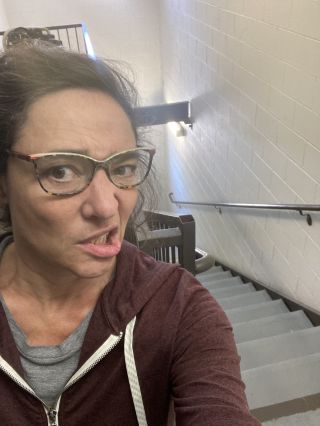Chronic Pain
An Ode to My Elevator
A Personal Perspective: Managing self care in difficult moments.
Posted August 21, 2023 Reviewed by Monica Vilhauer
I recently moved into a beautiful apartment on the fourth floor of a building where both of my boys can have their own rooms and we have balconies offering a view of downtown and the Front Range of the Rocky Mountains. I love my new space.
And then last week there was a fire alarm around dinner time. At first I was totally flummoxed. I was preparing to make fried chicken so I was sure I was going to set off the smoke alarm, but I was still chopping and marinating and dredging, so I was confused as to how it had happened already. It took an embarrassing amount of time before I figured out what was going on and turned to my son and said, “you know, we should probably head outside.” He concurred, even contributing his fire-drill expertise from middle school that we should definitely take the stairs down and not the elevator.
The stairs and the first floor really did smell like something was burning — toast? Hair? But it didn’t feel too urgent as we spilled out onto the street with our neighbors and our frightened dogs and discomfited babies.
Spoiler alert — someone on the first floor did, in fact, burn their dinner, but even after we were cleared to re-enter the building, the elevator was still locked by the firemen. Up the stairs we trudged, and it was only at six a.m. the following morning when I stumbled out into the dawn light with my dog that I realized the elevator was still locked. At 10 a.m. we got an email that it was broken, and I understood immediately how profoundly the loss of this elevator would affect my life.
My dog is a fuzzy senior citizen and the stairs are hard for her. By Saturday I had to help her climb the last two flights, and so I took her to stay with my ex. For my part, I can go up the stairs with relative ease most days but going down is a bummer, as my hips, knees, and ankles don’t respond well to gravity. There is only one other elevator in the building and it has been out of service since I moved into this building two months ago. So this means dynamically-disabled me has been on the stairs now for five full days.

I have two kids in the last throes of summer vacation who need stuff and rides to friends' houses and soccer practice, and I’m rushing out to drive them around between meetings. Grocery shopping has quickly become an exercise in triage — what is so urgent it gets to fill the one bag I am able to carry? I’m grateful my body is in a state that I am able to do these things at all, but each day it’s getting harder. My mobility is decreasing as my ire is increasing.
I feel endangered. If a joint dislocates or my soreness gets worse, I might literally get trapped in (or out) of this apartment. I feel angry. I’m paying a pretty penny to live in this place and I would not have moved in if there were no elevators. I feel outraged. According to the ADA it’s illegal to discriminate against disabled people through architecture. I feel helpless. I can go yell at the repairmen or the nice people in the leasing office, but nobody wants broken elevators.
All these emotions exacerbate my pain.
I am trying to focus on self care. I am resting my body when I can, taking hot baths. I called my physical therapist and she got on Zoom with me to remind me of tricks for keeping my skeleton stable on stairs (it's all in the core). I’m wearing my neck brace. I’m organizing my outings and doing my best to breathe through it. When my kids are at their dad’s, I’ll go to stay with a friend. And I’m asking for a discount in rent until the elevator is fixed because I am literally unable to access my home.
And, I wrote a little haiku:
Little metal box
How intensely I rely
On your vertical


